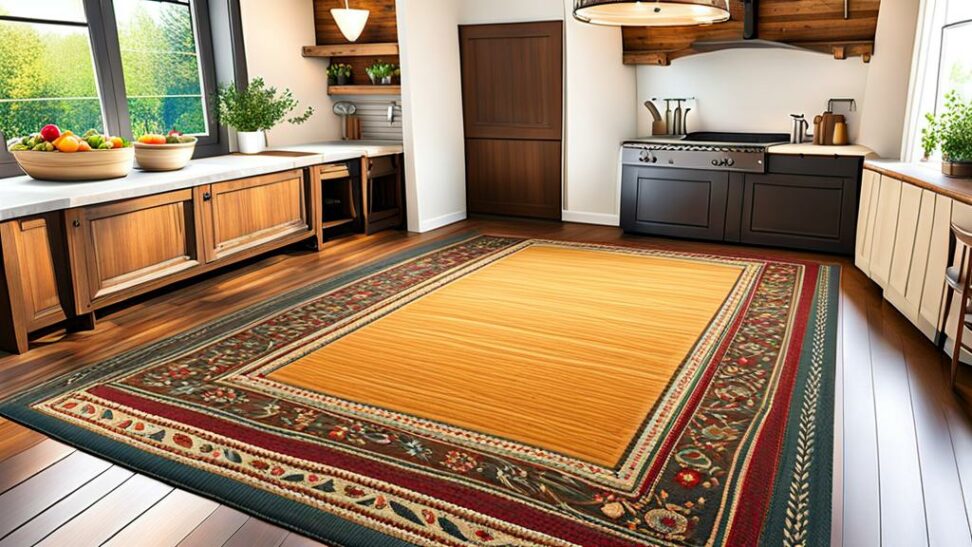Spruce Up Your Farmhouse Kitchen With The Perfect Rug
The farmhouse style is defined by its emphasis on natural materials, simplicity, and cozy comfort. Incorporating the right rug is one of the easiest ways to infuse a kitchen with rustic farmhouse charm.
A handmade cotton rug underfoot lends warmth. Soft jute rugs add organic texture. While vintage patterns and muted colors keep the look relaxed and inviting. Rugs ground a space, unify a decor scheme, and make cooking and dining more pleasurable.
Benefits of Using Rugs in Kitchens
Beyond looks, rugs offer many functional benefits in kitchen spaces:

- Warmth underfoot - Natural fiber rugs add comfort and prevent feet from getting cold, especially on tile or wood floors.
- Define spaces - Rugs distinguish individual zones like sink, table, or prep areas in an open concept kitchen.
- Protect floors - Padding underneath can guard floors from spills, chair scrapes, and heavy foot traffic.
- Add color/pattern - Rugs lend visual interest with colors and designs not always possible with permanent flooring.
- Cozy farmhouse vibe - Braided, woven, and nubby rugs reinforce the casual farmhouse aesthetic.
Things to Consider When Choosing a Farmhouse Kitchen Rug
Size
Pay attention to size when selecting a kitchen rug. General guidelines recommend a rug 24-36 inches smaller than your overall space. This creates a visible border for furniture placement and traffic flow.
Under a table, choose a rug that allows chairs to pull out and sit evenly with two chair legs on the rug. For high traffic zones like near a sink, size the rug to the area used when standing at the sink.
Material
Natural fiber rugs suit farmhouse spaces. Jute and cotton are affordable, casual options. Wool blends are soft and resilient. Consider how heavily the space is used when deciding durability.
Jute is very durable but shows some visible wear over time. Wool and cotton blends withstand spills and pets while hiding dirt well. Check that rug fibers can handle moisture from sponging down messes.
Color
Aim for colors drawn from the farmhouse palette like cream, tan, beige, slate blue, and charcoal gray. Even vintage inspired floral rugs use muted, neutral colors and distressed designs.
Avoid bright, saturated hues that feel too modern next to antique wood floors and painted cabinetry. Neutrals allow other decor and furnishings to pop while keeping the room soothing.
Pattern
Simple is best when it comes to farmhouse rug patterns. Solids and subtle textures complement the unadorned style. Understated stripes and checks or tone-on-tone florals work.
Stay away from large geometric prints or anything with a modern vibe. Choose patterns like worn plaids and florals that look aged and a bit faded. Vintage Persian rug repros are a good option.
Shape
Common farmhouse rug shapes include:
- Rectangular - The most versatile shape, works in front of sinks or under tables.
- Oval - Provides a tailored look in seating nooks or conversation areas.
- Runners - Ideal for high traffic spots like between countertops and islands.
Texture
Handmade rugs add delightful texture. Try woven jute, braided seagrass, or rag rugs. For softness underfoot, flatweave rugs offer texture without too much pile height.
Nubby cotton rugs provide cozy texture. Or find vintage style rugs lightly distressed for visual interest. Play with layering flat and nubby textures.
Backing
Any rug used in a kitchen should have a non-slip backing. Even natural fiber rugs can slide on tile and wood. Seek rugs with rubber or textured vinyl backings to prevent slips and falls.
Rug pads also help grip floors. Opt for ones made for wood or tile rather than carpet. Proper backing keeps rugs securely in place.
Incorporating Farmhouse Rugs in Kitchen Layouts
Now for the fun part: deciding where to place your perfect farmhouse rug!
In front of the kitchen sink is a popular spot. Rugs surround the main workspace while providing cushioning as you stand. Just make sure to allow access to plumbing.
Under dining tables anchors the eating area and stools won't slide as easily. Floating the table with a rug underneath emphasizes the vintage farm table.
Runners lining high traffic routes between islands, counters, and appliances add color while also protecting floors.
Tips for Styling Your Farmhouse Kitchen Rug
Finish pulling your kitchen together by decorating with the rug:
- Coordinate with cabinetry and flooring - Choose rug colors in the same color family.
- Layer multiple sizes and textures - Mixing materials like jute and cotton adds depth.
- Rotate seasonally - Change heavier rugs for cooler bamboo ones in summer.
- Wash occasionally - Spot clean stains and wash cotton rugs once a year.
It's the little touches like the perfect farmhouse rug that create a cohesive style. Vintage patterns, neutral palettes, and natural fibers reinforce the welcoming farmhouse aesthetic.
Pay attention to size, shape and placement to make sure your new rug works within your existing layout. Then get ready to enjoy your updated kitchen with charming farmhouse floors!